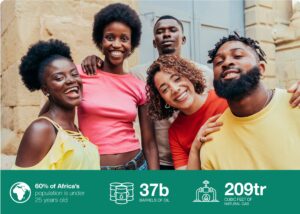Introduction
The African continent is an interesting paradox, abundant in untapped potentials and poorly managed resources, having everything needed at her fingertips, yet lacking the tools to make it work. Today, many African countries have an abundance of oil, gas and renewable energy, however, the road to resource optimization appears to be a long one.
Why is this the case? This is not just about the natural resources, it is about the people, particularly a new generation of African leaders, innovators and project makers – those who are equipped to midwife Africa’s energy transformation.
A country like Nigeria, Africa’s largest oil producer, is an example of African countries that demonstrate both immense opportunities and complex challenges, with a need to transition to a sustainable energy future.
Africa’s Energy Resources
Africa is blessed with mind-blowing energy resources, an estimated 600 trillion cubic feet of natural gas and 125 billion barrels of proven oil reserves1. Beyond these astonishing numbers, the real issue is how we are optimizing these resources. Nations such as Angola and Nigeria are big oil and gas players, and as the adoption of clean energy expands, more and more Africans are looking to harness their renewable energy potential – land, winds, water, sun, all elements to be tapped to energize the continent. The Nairobi Declaration of 2023 is tasking the African continent to attain 300GW of installed renewable energy by 20302. That is enough energy to transform millions of lives, but it won’t happen on its own. The architects of this change will be the project makers: the innovators, the managers, the operators who will bring this vision to life.

